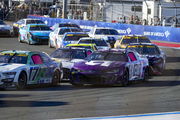
USA Today via Reuters
Feb 16, 2024; Daytona Beach, Florida, USA; NASCAR Cup Series driver Joey Logano (22) during practice for the Daytona 500 at Daytona International Speedway. Mandatory Credit: John David Mercer-USA TODAY Sports

USA Today via Reuters
Feb 16, 2024; Daytona Beach, Florida, USA; NASCAR Cup Series driver Joey Logano (22) during practice for the Daytona 500 at Daytona International Speedway. Mandatory Credit: John David Mercer-USA TODAY Sports
NASCAR All-Star race is popular because of its design and “huge” prize money. Despite being a non-points event, the USP of the All-Star race has always been, “Winner Takes it All”, with a cool $1 million being awarded to the victor. And this time, luck was on Joey Logano‘s side as he emerged victorious at North Wilkesboro Speedway.
So far, in the 2024 NASCAR season, Logano’s performance has been a hit and a miss. Devoid of a win before this past weekend, the 2022 Cup Series champion struggled to maintain his race pace on multiple occasions. However, come May 19, the No.22 driver secured a decisive P1 finish, leading Denny Hamlin by six-tenth of a second. However, Logano’s post-race comments regarding the $1 million prize raised some eyebrows.
ADVERTISEMENT
Article continues below this ad
Does Joey Logano want more cash?
Joey Logano was all up for a cause in his candid post-match interview. The cause was simple enough: adjust the prize reward with respect to the country’s inflation levels. The incident unfolded when a reporter posed a question, asking, “The difference between winning this race, first time, second time, and how much does a million bucks mean to your race team?” If you were to think that Logano would be thanking NASCAR for this prize money and talking about how much the hefty sum means to him, you couldn’t be more wrong!
Here’s what Logano had to say: “Quite a bit. Quite a bit. A million reasons to make me smile today, that’s for sure,“. However, the story doesn’t end here as the driver went on to mention, giving a sermon on inflation, “Maybe that’s one thing we should change is, you know, we should keep up with inflation. I mean, how much is it more now from when we started the All-Star Race? How many years ago did you start at a million bucks? 1985. Oh, my goodness. It should be three times the amount now.”
Although, Logano made these remarks in humor, it would surely resonate with other drivers. The data from US Bureau of Labor Statistics suggests that $1 million in 1985 would be equivalent to $2.5 million today!
Logano’s statement in essence underscores the economic reality of the motorsports world. The euphoria of winning eclipsed the cause and Joey Logano was quick to add, “Honestly, no matter what the check says, it feels great to win and just beat everybody. That’s what it’s all about.” Having said that, dualistic statements like these do raise concerns over financial sustainability in modern racing. And who would know it better than NASCAR teams battling charter woes?
Trending
The broader impact on Non-Charter Teams
Speaking of financial sustainability, non-charter teams have been marginalized, in terms of money, ever since the charter system was introduced by NASCAR back in 2016. For example, the $7.7 billion media rights deal has nothing on the plate for non-charter teams. While the charter teams are struggling to make their share of profit, non-charter teams are reportedly going broke.
When one looks at the trend before 2016, non-charter teams used to contend for championships regularly. But, things have changed since then and it’s very rare to see a non-charter team win a race or even finish in the top 5. Reportedly, the return for investments is at an all-time low for these teams.

USA Today via Reuters
Mar 10, 2024; Avondale, Arizona, USA; NASCAR Cup Series driver Denny Hamlin (11) leads the start of the Shriners Children’s 500 at Phoenix Raceway. Mandatory Credit: Gary A. Vasquez-USA TODAY Sports
The lack of guaranteed race entries for the non-charter teams only adds insult to the wound. Evidently, the current business model hasn’t been profitable for big-named chartered teams either. Take NASCAR’s winningest team, Hendrick Motorsports, for example. Even though Rick Hendrick has been a part of the sport since 1984, it seems love is all that keeps him associated to NASCAR as, when it comes to profit, there’s nothing to look at.
ADVERTISEMENT
Article continues below this ad
Jeff Gordon was the one to reveal this heartbreaking situation when he said, “We don’t make money right. I don’t think Hendrick Motorsports has made a profit in 10 years. And then you say, ‘Why do you do it?’ Well, it’s because Rick Hendrick loves the sport, he loves the cars and it’s good branding.”
“But if we didn’t have all the B2B, and we’re the few teams out there that are fortunate to be able to have B2B ties. The Hendrick Auto Group and Hendrick Motorsports together and bring these sponsors in, I don’t know where would that put us if we didn’t have that. It’s not just about Hendrick, and there’s a lot of teams struggling,” the HMS vice chairman added.
ADVERTISEMENT
Article continues below this ad
So imagine if a big name like HMS can struggle to make ends meet, where that puts smaller teams and the ones with no permanent charters. And even Joe Gibbs shared his two cents on the situation. “The charter system has been a game-changer for our team. It offers a guaranteed starting spot and a share of the revenue, which has allowed us to plan long-term. However, I understand it makes it tougher for new teams to break into the sport,” he shared.
Additionally, if we look at the steep price for charters, the situation does look bleak. Case in point, just last year, Spire Motorsports bought a charter from Live Fast Motorsports for a staggering $40 million. To cap it up, Joey Logano’s call for a raise in prize money seems to have more to it than meets the eye. Is it a call for financial equity? What do you think?
ADVERTISEMENT
ADVERTISEMENT
ADVERTISEMENT
ADVERTISEMENT






